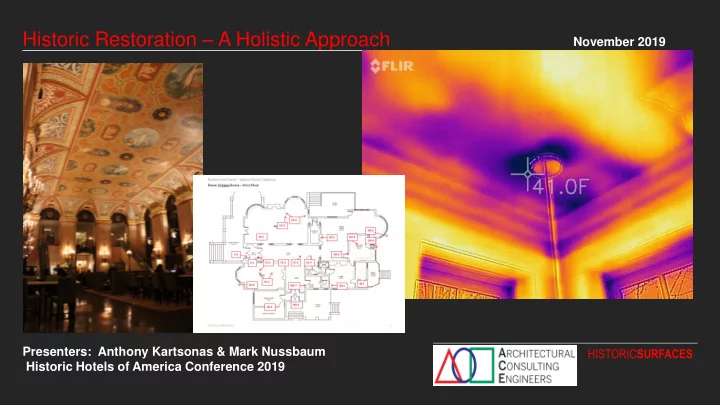

Historic Restoration – A Holistic Approach November 2019 Presenters: Anthony Kartsonas & Mark Nussbaum HISTORIC SURFACES Historic Hotels of America Conference 2019
What we will discuss Common types of historic surface issues Common environmental and infrastructure issues that can effect historic surfaces Typical assessment strategies used to inform the restoration of historic surfaces
Historic Surfaces & Materials Commonly found materials in historic buildings include: • Plaster • Paint • Wood Finishes • Metal • Marble & other stones
Causes of Deterioration • Water
Causes of Deterioration • Water • Water
Causes of Deterioration • Water • Water • Water
Causes of Deterioration • Water • Water • Water • Did I say Water?
Causes of Deterioration Other Causes • Structural Issues • Mechanical Wear • Natural Aging • Incompatibility of Materials, Workmanship, & Alterations • Environmental Issues
Causes of Deterioration - Water Typical Causes • Infiltration from the building exterior • Infiltration from mechanical systems Effects • Efflorescence & Plaster deterioration • Flaking and Peeling paint • Water staining on finishes
Causes of Deterioration – Structural Issues Typical Causes • Building Movement • Natural Aging • Environmental Issues Effects • Cracks and unstable elements
Causes of Deterioration – Mechanical Wear Typical Causes • Manual Touch by public • Moving of Furniture & Furnishing Effects • Nicks, Scrapes, & Abrasions • Losses
Causes of Deterioration – Natural Aging Typical Causes • Normal ‘Shelf Life’ • Exposure (Environment) Effects • Material Breakdown • Finish Discoloration or Degradation
Causes of Deterioration – Incompatibility Typical Causes • Wrong Material • Wrong / Poor Repair • Poor Decision Effects • Material Breakdown • Poor adhesion on finishes
Causes of Deterioration – Environmental Issues Typical Causes • Mechanical System Operations / Failure • Control of Exterior Environment Effects • All of the Above
Finding Solutions First Step • Document & Evaluate the Condition Issues • Look for the Causes Methods • Material Assessments • Lab Analysis • Environmental Assessment & Monitoring
Finding Solutions Material Assessment • Cursory Survey • Comprehensive Examination
Finding Solutions Lab Analysis • Determine components of original material • Find elements that could be contributing to the problem
Finding Solutions Environmental Assessment & Monitoring • Monitor Relative Temperature & Humidity • Review of Mechanical Systems
Environmental Assessment & Monitoring Temperature & Relative Humidity data collection This can be done at any point to create a baseline of data. If setting a survey before an issue arises then this data can be an early indicator of an issue. OR it can be started once an issue is discovered Looking for understanding of how the T&RH fluctuates in the space of concern.
Environmental Assessment & Monitoring Tools for Measurement
Environmental Assessment & Monitoring
Environmental Assessment & Monitoring Detailed survey of the space, building and building systems • Building envelope deficiencies could be directly contributing to issues through bulk water leaks or excessive air infiltration. • Building systems could be directly contributing to the issue through leaks – water, steam, conditioned air, sanitary, storm water, etc.. • Building systems could be indirectly contributing due to poor performance in removing excess humidity or poor temperature control. • IR survey to see hot/cold spots behind walls and ceilings. • Blower door testing.
Environmental Assessment & Monitoring Infrared Imaging
Environmental Assessment & Monitoring
Environmental Assessment & Monitoring Sometimes the results are indeterminate / inconclusive In that case, if there is no smoking gun? • Expanded T & RH Data collection is needed. • May Require Destructive testing with the use of a Boroscope
Case Study – Palmer House At first glance – Everything Looks Great
Case Study – Palmer House At first glance – Everything Looks Great • Small areas requiring attention
Case Study – Palmer House Upon closer examination - Significant Flaking Paint
Case Study – Palmer House Cursory examination to possibly identify source of the problem
Case Study – Palmer House Main Project was to correct the most defective areas.
Case Study – Palmer House Before & After
Conclusion Best Tool for Preservation
Conclusion Best Tool for Preservation • Inform Yourself
Conclusion Best Tool for Preservation • Inform Yourself • Inform Yourself
Conclusion Best Tool for Preservation • Inform Yourself • Inform Yourself • Inform Yourself
Conclusion Best Tool for Preservation • Inform Yourself • Inform Yourself • Inform Yourself Create a Plan
Conclusion Best Tool for Preservation (Very Best) Call specialists like Anthony Kartsonas of Historic Surfaces LLC & Mark Nussbaum of Architectural Consulting Engineers. Will work for: • Monetary Funding • On Occasion - Well Cooked Meals and Beverages • And now – Stays at fabulous Historic Properties
Conclusion In general, call a specialist. Feel free to contact us: Anthony Kartsonas historicsurfaces@gmail.com 708-205-7164 / Cell Mark Nussbaum mark@ace-oakpark.com 708-524-0272
Recommend
More recommend